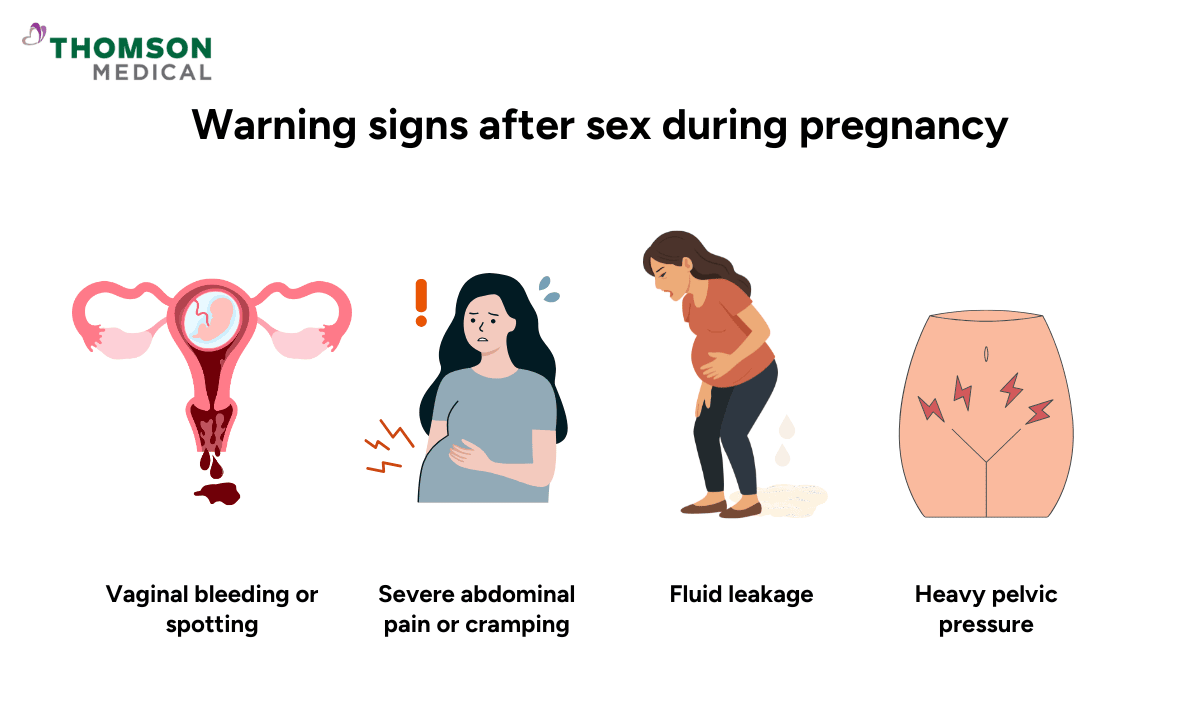You may want to stay intimate with your partner during pregnancy, but you worry that intercourse might harm your baby or trigger premature labour. Your concerns are understandable, as you don't want anything to happen to your little one. Fortunately, knowing when intimacy is safe and when to avoid it can help you maintain a healthy sexual relationship with your partner while ensuring your baby's wellbeing.
Is it safe to have sex during pregnancy?

Sexual intercourse during pregnancy is generally safe for most women, especially if you have a low-risk pregnancy. However, pregnancy brings many physical and emotional changes that may affect your sex drive and how comfortable you feel during intimacy.
As your body grows and changes, your comfort during sexual intercourse might change too. Talking openly with your partner helps both of you stay emotionally close and physically comfortable during this time.
Can sexual intercourse cause miscarriage or early labour?
While it’s natural to worry, intercourse is not likely to cause miscarriage in a normal pregnancy. Most miscarriages happen due to chromosomal or hormonal issues and not because of sexual activity.
Similarly, intercourse isn’t usually the cause of preterm labour (early labour before 37 weeks). However, if you have a history of a preterm birth or a cervical insufficiency (cervix opens or shortens too early during pregnancy), your doctor may ask you to avoid sexual intercourse. This is because prostaglandins (natural chemicals in semen) can soften the cervix.
How does pregnancy affect your sex drive?
Pregnancy hormones can affect your sexual desire at different stages. A study found that pregnant women’s sex drive often drops during the first trimester, rises in the second, and then declines again in the third trimester.
- First trimester:
- Higher levels of hormones such as hCG (human chorionic gonadotropin) and progesterone can lead to nausea and fatigue, which might reduce your sexual desire.
- Second trimester:
- As nausea fades and blood flow increases, you may feel more energetic and experience a stronger sexual desire.
- Third trimester:
- As your belly grows, you may experience back pain or swelling, which can make intercourse uncomfortable.
- At the same time, you may feel more emotionally connected to your partner and enjoy gentler intimacy.
What sexual positions are comfortable during pregnancy?
As your body grows, some positions may feel awkward or uncomfortable. The good news is that adjusting how you and your partner move can make intimacy safer and more enjoyable.
Side-by-side (spooning) is comfortable as your belly grows
The woman on top position allows you to control the depth and movement
The modified missionary position works well with pillows to support your back and hips
Rear entry (doggy style) is safe as long as there is no pressure on your belly
During pregnancy, you should avoid lying flat on your back, especially from 28 weeks until your baby is born. As this can put pressure on major blood vessels that’s connected to your baby.
If you’re unsure which sexual positions are safe or comfortable during your pregnancy, request an appointment with a Thomson Medical specialist. Our doctors can provide personalised guidance based on your trimester, comfort level, and medical needs.
When should you avoid sex during pregnancy?
Sexual intercourse is usually safe in a healthy pregnancy. However, there are certain situations where your doctor may advise you to avoid intercourse.
You should avoid sexual intercourse if you experience any of the following conditions:
The placenta is lying too low and covers the cervix, known as placenta previa
You’re at risk of preterm labour
A weak cervix, which means the lower part of your womb opens too early
Vaginal infections such as bacterial vaginosis or herpes
Premature rupture of membranes, meaning your water breaks and amniotic fluid leaks before labour starts
You’re carrying twins or more
If any of these apply to you, it’s best to follow your doctor’s advice and avoid sexual intercourse until it’s considered safe again.
Our specialist
Loading...
What warning signs should you look out for after sex during pregnancy?

Your safety and your baby's health come first. See your doctor immediately if you notice any of the following after sexual intercourse:
Vaginal bleeding or spotting, especially if it’s bright red or comes with cramps
Severe abdominal pain or cramping
Fluid leakage, which could mean your water has broken
Heavy pelvic pressure, which might signal preterm labour
If you experience any warning signs after sexual intercourse, seek immediate medical evaluation. Request an appointment with a Thomson Medical specialist to ensure any issues are addressed promptly and both your pregnancy and baby remain safe.
FAQ
Can sex during pregnancy hurt the baby?
No, sexual intercourse during pregnancy will not harm the baby. Your baby is well protected inside your uterus (womb), which is deep inside your pelvis with strong muscles. A thick mucus plug inside your cervix also protects your baby from germs and infection.
However, if you have any pregnancy complications or high-risk conditions, follow your doctor’s advice before having sexual activity.
When are contractions after sexual intercourse normal, and when should I worry?
Mild tightening of the belly, known as Braxton Hicks contractions (practice contractions), can happen after sexual intercourse. These are normal, painless, and usually go away after some rest. You should see a doctor if the contractions become regular or stronger as this could be a sign of preterm labour.
Is it okay for sperm to go inside while pregnant?
Yes, it’s generally safe for sperm to enter the vagina during pregnancy. The baby remains protected by the cervix and the amniotic sac. However, if you have conditions such as placenta praevia or a risk of preterm labour, your doctor may advise avoiding vaginal penetration to reduce complications.
Is bleeding or cramping after sexual intercourse normal?
Light spotting or mild cramping after intercourse can happen, especially in the second trimester, because the cervix has more blood flow during pregnancy. This is usually harmless. However, if you experience heavy bleeding, severe pain, or persistent cramps, it may signal a problem such as placenta praevia or miscarriage.
Can sexual intercourse induce labour in the third trimester?
Sexual intercourse may sometimes cause mild contractions because semen contains prostaglandins. However, it rarely triggers labour unless your body is already ready for birth. Some women at full term find that intercourse helps start labour naturally, but it’s not a guaranteed or medically proven method.
Do you need to use condoms during pregnancy?
If both partners are in a stable, monogamous relationship and neither has a sexually transmitted infection (STI), condoms are not necessary. However, if there's any risk of infection, dental dams and condoms should be used to prevent transmission. If your cervix is sensitive, condoms may also help reduce irritation that semen can cause.
The information provided is intended for general guidance only and should not be considered medical advice. For personalised recommendations and tailored advice based on your unique situations, please consult a specialist at Thomson Medical. Request an appointment with Thomson Medical today.
Reference:
Carbone, L., De Vivo, V., Saccone, G., D’Antonio, F., Mercorio, A., Raffone, A., Arduino, B., D’Alessandro, P., Sarno, L., Conforti, A., Maruotti, G. M., Alviggi, C., & Zullo, F. (2019). Sexual Intercourse for induction of Spontaneous Onset of Labor: A Systematic Review and Meta-Analysis of Randomized Controlled Trials. The Journal of Sexual Medicine, 16(11), 1787–1795. https://doi.org/10.1016/j.jsxm.2019.08.002
Heazell, A., Li, M., Budd, J., Thompson, J., Stacey, T., Cronin, R., Martin, B., Roberts, D., Mitchell, E., & McCowan, L. (2017). Association between maternal sleep practices and late stillbirth – findings from a stillbirth case‐control study. BJOG an International Journal of Obstetrics & Gynaecology, 125(2), 254–262. https://doi.org/10.1111/1471-0528.14967
Wójcik, M., Aniśko, B., & Siatkowski, I. (2024). Quality of life in women with normal pregnancy. Scientific Reports, 14(1). https://doi.org/10.1038/s41598-024-63355-7
For more information, contact us:
Thomson Specialists (Women's Health)
Thomson Women's Clinic (TWC)
- Novena:
6592 6686 (Call), 8611 8986 (WA) - Bukit Batok:
6569 0668 (Call), 8686 3525 (WA) - Choa Chu Kang:
6893 1227 (Call), 8282 1796 (WA) Jurong:
6262 8588 (Call), 6262 8588 (WA)- Katong (female doctor):
6970 2272 (Call), 8611 9020 (WA) - Punggol:
6243 6843 (Call), 8811 0328 (WA) - Sembawang: 6753 5228
- Sengkang: 6388 8125
- Serangoon (female doctor): 6382 3313
- Tampines: 6857 6266
- Tiong Bahru: 6276 1525
